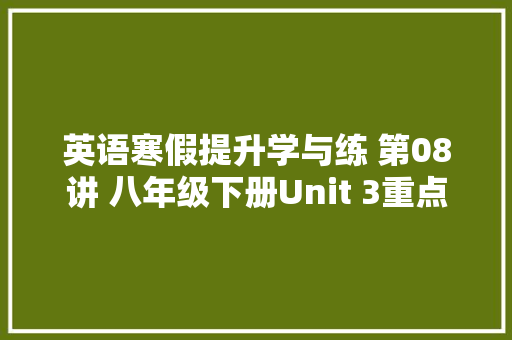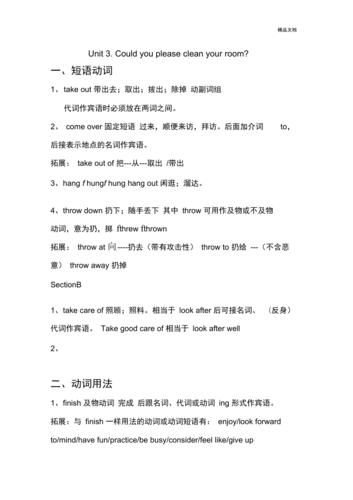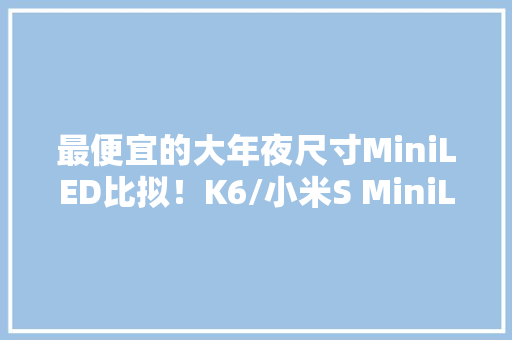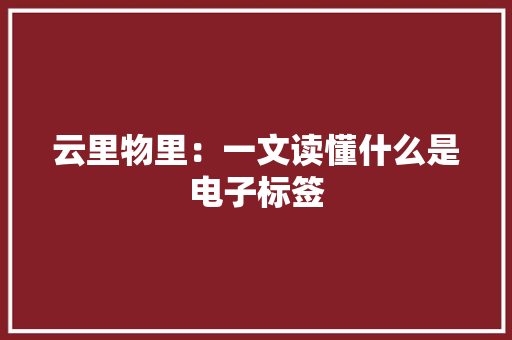新知导航:熟习课程内容、节制知识脉络
根本知识:知识点全面梳理,节制必备

重点影象:关键点快速影象,提升能力

小试牛刀:考点阐发+过关检测,合理运用
考点1、Could you please do sth.?的用法
教材原文 Peter, could you please take out the rubbish?彼得,请你去倒一下垃圾好吗?
“Could you please do sth.?”用于委婉地提出要求。
—Could you please open the window? 请你开一下窗户,好吗?
—Yes, sure.好的,当然可以。
拓展 “Could you please do sth.?”的答语,有如下两种情形:
接管要求时
可以用 Yes, sure./Sure./Of course./Certainly./No problem./With pleasure.等来回答
谢绝要求时
可以用Sorry./Sorry, I can’t.等来回答,还可以用I have to do sth.来阐明缘故原由
—Could you please fold your clothes? 请叠一下你的衣服,可以吗?
—No problem.没问题。
“Could you please do sth.?”的否定形式是"Could you please not do sth.?”。
考点2、 take out的用法·
教材原文 Peter, could you please take out the rubbish? 彼得,请你去倒一下垃圾,好吗?
take out the rubbish意为“倒垃圾”,个中take out表示“取出;拿出”,如果take out的宾语是名词,该名词可以位于take和out之间,也可以位于take out之后,如果宾语是代词,该代词只能位于take和out之间。
Please take out the old newspapers.=Please take the old newspapers out.请把旧报纸拿出去。
My wallet is in the bag. I have to take it out first.我的钱包在包里,我得先把它拿出来。
考点3、 做家务的短语表达
教材原文 Could you please sweep the floor? 请你扫一下地,好吗?
本句中的sweep the floor 意为“扫地”,个中sweep是动词,意为“扫;打扫”,其过去式和过去分词都是swept。
My mother is sweeping the floor at the moment.我妈妈这会儿正在扫地。
拓展 和“家务劳动"有关的短语
take out the rubbish/trash 倒垃圾rubbish(英式);trash(美式) fold one’s clothes 叠衣服
sweep the floor 扫地 clean the room 打扫房间 make one’s/the bed 铺床
do the dishes 洗餐具=wash the dishes
考点4、 as...as的用法·
教材原文 I’m just as tired as you are! 我和你一样累!
as...as...表示“和······一样······”,as...as...之间要用形容词或副词的原级。
She is as tall as her elder brother.她和她哥哥一样高。
拓展as...as...的否定构造是not as/ao...as....,表示“不如······;比不上······”。
She is not as/so tall as her elder brother.她没有她哥哥个子高。
考点5、 neither 勾引的倒装句
教材原文 For one week she did not do any housework and neither did I.整整一周她没有做任何家务,我也没有做。
本句中的 neither did I是neither勾引的倒装句,构造是“neither+助动词/be动词/情态动词+主语”,表示“······也不”。
—I don’t like pop music.我不喜好盛行音乐。
—Neither do I.我也不喜好。
拓展 so/neither勾引的倒装句
构造
用法
so+助动词/be动词/情态动词+主语
当前面阐述切实其实定事实也适用于后者时
neither+助动词/be动词/情态动词+主语
当前面阐述的否定事实也适用于后者时
She likes music and so do I.她喜好音乐,我也喜好。
She hasn’t read it and neither have I.她没有读它,我也没有读。
考点6、 in surprise的用法
教材原文 “What happened?”she asked in surprise.她吃惊地问道:“发生什么事了?”
in surprise 意为“惊异地”,个中surprise是名词,意为“惊异”,surprise还可以作动词,意为“使惊异”。
She looked at me in surprise.她惊异地看着我。
Your story surprised me so much.你的故事使我太惊异了。
考点7、 in order to的用法
教材原文 They should spend their time on schoolwork in order to get good grades and get into a good university.为了取得好成绩,进入一所好大学,他们该当把他们的韶光花在学业上。
本句中的 in order to get good grades and get into a good university是目的状语,个中in order to表示“目的是;为了”,后跟动词原形.in order to do sth.表示“为了做某事”,否定构造是in order not to do sth.“为了不做某事”。
We started early in order to arrive before dark.为了在入夜前到达,我们很早就动身了。
He got up early in order not to be late for school.为了上学不迟到,他起得很早。
拓展so that/ in order that 表示“目的是,为了”,用来勾引目的状语从句,此时可以转化为含to/in order to的句子。
He studied hard so that/in order that he could pass the exam.=He studied hard to/in order to pass the exam.
为了能通过考试,他努力学习。
考点8、provide的用法
教材原文 It is the parents’ job to provide a clean and comfortable environment at home for their children.在家中为他们的孩子供应一个干净、舒适的环境是家长们的事情。
provide用法
①provide sb. with sth.意为“供应给某人某物”。
Sheep provide us with wool.羊供给我们羊毛。
②provide sth. for sb.意为“给某人供应某物”。
The hotel provides a shoe-cleaning service for guests.该宾馆为客人供应擦鞋做事。
拓展 短语offer sth.to sb.和offer sb.sth.也有“为某人供应某物”的意思哟!
考点9、 depend on的用法
教材原文 Children these days depend on their parents too much.现在的孩子过于依赖他们的家长。
depend on是固定短语,表示“依赖;相信”,也作 depend upon。
Health depends on good food, fresh air and enough sleep.
康健依赖的是好的食品、新鲜的空气和充足的就寝。
It depends on whether she likes the boss or not.这取决于她是否喜好这个老板。
拓展 常见的“动词+on”的短语
depend on依赖;依赖 get on 上车 turn on 打开 call on 号召 come on快点;加油
pass on转交;传给 put on穿上;上演 concentrate on专心于;集中精力于
考点10、since的用法
教材原文 Since they live in one house with their parents, they should know that everyone should do their part in keeping it clean and tidy.既然他们与父母同住在一个屋檐之下,他们该当知道每个人都应该尽自己的职责来保持家里干净整洁.
本句含有since 勾引的缘故原由状语从旬,since作连词,意为“由于;既然”。
Since we have no money, it’s no good thinking about a holiday.既然我们没有钱,考虑度假并没有用。
拓展 since 还有如下含义和用法:
prep.自······以来
He has eaten nothing since yesterday.自从昨天以来他没吃过东西。
adv.从那往后
I saw him in June, but we haven’t met since.我在六月份见到过他,但从那往后我们未见过面。
conj.自······以来
He has been in the army since he left school.他自毕业以来一贯在部队里。
词型转换
throw(v.)→ (pt.) threw扔,掷sweep(v.)→(pt.) swept打扫lend(v.)→(pt.) lent 借出stress (n.)→(adj.)stressed 紧张的,有压力的develop(v.)→(n) development发展→(adj.) developed 发达的
→(adj.) developing 发展中的
independence(n.)→(adj.) independent独立的fair (adj.) →(反义词) unfair 合理的,公正的fairness (n.) →(反义词) unfairness 合理性,公正性
drop(v.)→ (pt.)dropped →(现分)dropping 掉下,落下ill(adj.)→ (n.) illness疾病→worse (比较级) →worst (最高级)
neither(pron.)两者都不→both (pron.)两者都borrow(v.)借用,借进→lend(v.) 借出neighbor(n.)邻居→(n.) neighborhood(n.) 街区provide (v.) →(pt.) provided供应,供应angry(adj.)生气的 →(adv.) angrily生气地pass(v.)→(单三) passeshang(v.) 悬挂→(pt.) hunginvite (v.) →(n.) invitation 约请(不可数);请柬(可数)短语归纳
1.do the dishes = wash the dishes 洗碗碟
2.take out the rubbish 把垃圾拿出去
3.fold your clothes 叠衣服
4.sweep the floor 扫地
5.make your / the bed 铺床
6.clean the living room 打扫客厅
7.No problem. 没问题
8.go out for dinner. 出去用饭
9.stay out late 在外待到很晚
10.get a ride 搭便车 give sb a ride 捎某人一程
11.give me a ride to town 开车送我到镇上
12.help out with a few things 帮助做些事情
13.at least 至少 at most 至多
14.finish (doing) sth. 完成(做)…
15.be back = come back 回来
16.be/ come back from shopping购物回来
17.any minute/ second/ moment now 随时;急速,立时
18.throw down my bag 扔下我的书包
19.take the dog for a walk 溜狗
20.come over 走过来 come over to+ sp. 顺便来访
21.in surprise 惊奇地
22.all the time 一贯;总是
23.as soon as 一……就……(主将从现)
24.do some washing/shopping/cleaning 洗衣服/ 购物/ 做清洁
25.be angry with sb. 对某人生气
26.neither of us 我们两个都不…. both of us 我们两个都…
27.work all day 事情一整天
28.share the housework 分担家务
29.a clean and comfortable home 一个干净又舒畅的家
30.hang out with sb. 同某人一起闲逛
31.never help out around the house 从不帮助做家务
32.get something to drink/ eat 弄些喝的东西
33. do chores = do housework 做家务
34.buy some snacks and drinks 买一些饮料和零食
35.enough stress from school 来自学校的足够的压力
36.a waste of time 摧残浪费蹂躏韶光
37.get into a good university 进好大学
38.depend on 依赖……
39.mind doing sth. 介意做某事
40.develop children’s independence培养孩子们的独立性
41.a developing country 一个发展中国家 a developed country 一个发达国家
42.the idea of fairness 公正意识
43.fall ill 生病
44.as a result 结果;因此
45.grades drop 成绩低落
46. borrow some money from sb. 从某人那里借些钱
47. invite sb. to a party 约请某人参加聚会
考点一、核心单词填空
1.Susan, please f your quilt after you get up in the morning.
2.—I have no money to buy any food. Could you please l me some?
—Of course. Here is ten yuan.
3.Look! The old man is picking up r near the dustbin (垃圾箱).
4.—Could you p me the pen?
—Sure, here you are.
5.—Wow, the classroom is so clean.
—We s the floor just half an hour ago.
6.It’s very important to d children’s interest in reading from an early age.
7.Don’t w food. You should eat up the food on the plate.
8.Jessica lives next to my house and we are n .
9.It’s u for parents to do all the housework at home. Kids should also help with housework.
10.It’s the parents’ job to p a clean and comfortable environment at home for their children.
考点二、重点词块填空
1.我们一上公共汽车,车就开动了。
The bus left we went on it.
2.萨莉昨天没上学,由于她得在家里照顾她的妈妈。
Sally didn’t go to school yesterday because she had to her mother at home.
3.康健取决于良好的饮食习气、合理的磨炼和充足的就寝。
Health good eating habits, proper exercise and enough sleep.
4.为了保护眼睛,他很少利用电子产品。
protect his eyes, he seldom uses electronic products.
5.你不能一贯看电视。
You can’t watch TV .
6.她常常帮助她的妈妈倒垃圾。
She often helps her mother .
7.你常常洗餐具吗?
Do you often ?
8.“你已经在这里了?” 海伦惊奇地问。
“You are already here?” Helen asked .
9.这个事情有点无聊,不过至少报酬还行。
The job is a bit boring but the pay is OK.
10.我妈妈让我不要在外待到很晚。
My mother asks me not to .
考点三、措辞点演习
一、单项选择
1.—Could I ________ your bike?
—Sure. But you mustn’t ________ it to others.
A.lend; lend B.lend; borrow
C.borrow; lend D.borrow; borrow
2.—Could you please clean the living room?
—Sorry, I ________. I’m doing my homework.
A.can’t B.couldn’t C.shouldn’t D.won’t
3.—Jim didn’t finish his homework.
— ________.
A.Neither did Bob B.Neither Bob did
C.So did Bob D.So Bob did
4.—Could you please do the dishes?
—________. I cut my finger and I’m trying not to get it wet.
A.Yes, sure B.No problem C.Sorry, I’m afraid I can’t D.That would be fine
5.“Stall Economy” (地摊经济) has won high praise because it can ________ the people with more chances to work.
A.offer B.provide C.give
6.—Would you mind ________ the TV? It’s too noisy.
—Sorry. I will do it at once.
A.turn off B.turning off C.to turn off D.turned off
7.Could you please ________ loudly here? Emma is doing her homework.
A.don’t talk B.not talk C.no talk D.not to talk
8.There’s no need for you ________ here. I can finish the rest of the work by myself.
A.to stay B.stay C.staying D.stayed
9.In the examination, the ________ you are, the ________ mistakes you’ll make.
A.careful; little B.more careful; less C.careful; few D.more careful; fewer
10.The football fans cheered ______ they heard the exciting news.
A.even though B.in order that
C.as soon as D.as long as
二、用所给单词的精确形式填空
11.Though he is young, he is very (depend). He does everything by himself.
12.Mum, you are (fair). Why do you only want me to do chores?
13.There is no need (look) up every new word in the dictionary when you are reading.
14.My father has a sense of (fair).
15.The (develop) of 5G makes people’s life more convenient.
考点四、语篇阅读演习
一、完形填空
After coming back from school, Nancy often has a walk 1 her dog. But last month, Nancy was too 2 to walk. She threw her schoolbag down and went to the living room to watch TV. As soon as she 3 the TV set, her mom came in and wanted her to take the 4 for a walk.
But Nancy wanted to watch TV first. Her mother became angry 5 she thought she did housework by herself every day, but Nancy always watched TV and 6 helped her with the chores. However, Nancy thought she was as tired as her mother. And she 7 back to her mother.
Nancy’s mother was so mad that she said 8 . She didn’t do any housework for a week, 9 did Nancy. As a result, everything was dirty.
Just at that time, Nancy realized that she was wrong. So she tried her best to 10 the room clean and tidy. Her mother was surprised to see that, but she was happy.
From this story, we should know to share the housework with our parents to make a clean and comfortable home.
1.A.for B.with C.to D.at
2.A.tired B.excited C.happy D.sad
3.A.turned into B.turned off C.turned down D.turned on
4.A.cat B.duck C.dog D.pig
5.A.because B.while C.when D.though
6.A.always B.often C.sometimes D.never
7.A.turned B.shouted C.looked D.got
8.A.nothing B.anything C.something D.everything
9.A.either B.both C.neither D.so
10.A.take B.make C.know D.have
二、阅读还原7选5
Many kids help their parents with chores, such as doing the dishes, cleaning the living room and taking out the rubbish. 11 But some people do not think that kids should get rewards by doing chores. Susie Walton, an expert, believes that by rewarding kids, parents are sending a message that work isn’t important unless you can get something. “Running any kind of family is teamwork,” Walton says. “A home is a living place for everyone in the family. 12 ”
Other people believe that getting money or other rewards makes kids do chores happily and it also teaches them real world lessons about what they need to do to make money. There are also apps(运用软件) now. 13 Kids can change them into real life rewards either online or in the real world. “We hope kids can do more chores so they can get more rewards,” one man says.
What do you think? Should kids get rewards by doing chores? 14
Write a 200word reply and send it to us. 15 If you want to read more ideas about this topic, you can click here.
A.Or should kids help do chores without getting anything?
B.It’s important for kids to see that we all have responsibilities(任务) in the house.
C.Parents should make their kids do more chores.
D.Kids should do chores as young as possible.
E.The last day for reply is April 10th.
F.With the ChoreMonster app, kids can get points and online gifts by doing chores.
G.And some kids get money or other rewards(奖赏) such as more computer time by doing chores.












